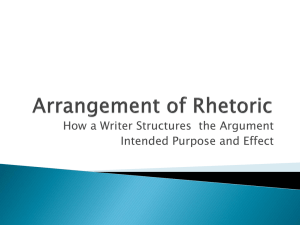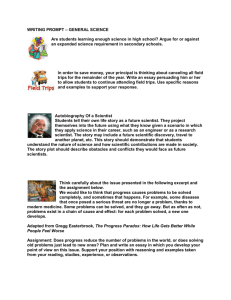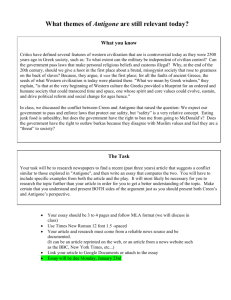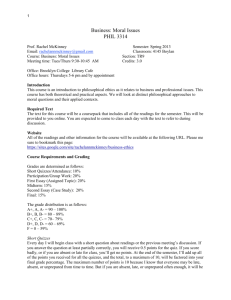Ancient Greek Contributions DBQ: Documents & Essay
advertisement
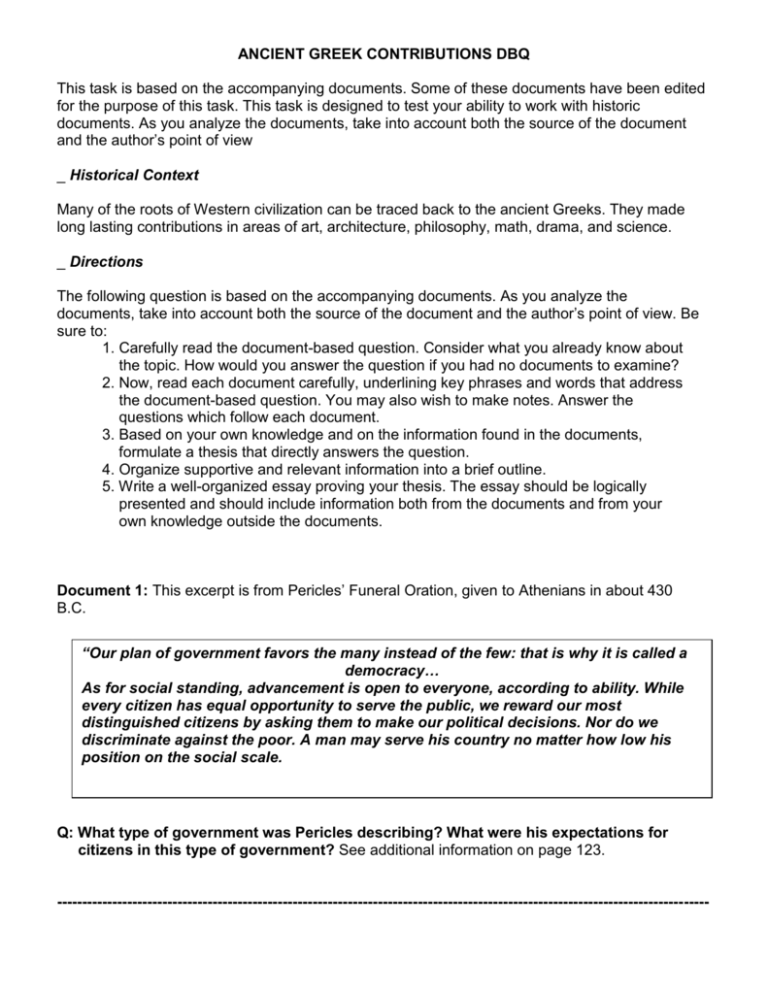
ANCIENT GREEK CONTRIBUTIONS DBQ This task is based on the accompanying documents. Some of these documents have been edited for the purpose of this task. This task is designed to test your ability to work with historic documents. As you analyze the documents, take into account both the source of the document and the author’s point of view _ Historical Context Many of the roots of Western civilization can be traced back to the ancient Greeks. They made long lasting contributions in areas of art, architecture, philosophy, math, drama, and science. _ Directions The following question is based on the accompanying documents. As you analyze the documents, take into account both the source of the document and the author’s point of view. Be sure to: 1. Carefully read the document-based question. Consider what you already know about the topic. How would you answer the question if you had no documents to examine? 2. Now, read each document carefully, underlining key phrases and words that address the document-based question. You may also wish to make notes. Answer the questions which follow each document. 3. Based on your own knowledge and on the information found in the documents, formulate a thesis that directly answers the question. 4. Organize supportive and relevant information into a brief outline. 5. Write a well-organized essay proving your thesis. The essay should be logically presented and should include information both from the documents and from your own knowledge outside the documents. Document 1: This excerpt is from Pericles’ Funeral Oration, given to Athenians in about 430 B.C. “Our plan of government favors the many instead of the few: that is why it is called a democracy… As for social standing, advancement is open to everyone, according to ability. While every citizen has equal opportunity to serve the public, we reward our most distinguished citizens by asking them to make our political decisions. Nor do we discriminate against the poor. A man may serve his country no matter how low his position on the social scale. Q: What type of government was Pericles describing? What were his expectations for citizens in this type of government? See additional information on page 123. ---------------------------------------------------------------------------------------------------------------------------------- Document 2: This is an excerpt from the play Antigone by Sophocles, written in about 441 B.C. In this play, Antigone defies the king’s order and buries her brother, who was killed leading a rebellion. Creon: And still you dared to overstep these laws? Antigone: For me, it was not Zeus who made that order. Nor do I think your orders were so strong that you, a mortal man, could overrun the gods’ unwritten and unfailing laws…I know I must die…but if I left my brother dead and unburied, I’d have cause to grieve as now I grieve not. Q: What values are expressed in this Greek play? See additional information on page 129. ---------------------------------------------------------------------------------------------------------------------------------- Document 3: This quotation is from Socrates, who lived from about 470 to about 399 B.C. “The unexamined life is not worth living” Q: Who was Socrates, and what was he suggesting in this quote? See additional information on page 130. ---------------------------------------------------------------------------------------------------------------------------------- Document 4: This quotation is from Aristotle, who lived in Greece from 384 to 322 B.C. “Since human reason is the most godlike part of human nature, a life guided by human reason is superior to any other…For man, this is the life of reason, since the faculty of reason is the distinguishing characteristic of human beings” Q: Who was Aristotle, and what did he believe about human nature? See additional information on page 132. ---------------------------------------------------------------------------------------------------------------------------------- Document 5: The Parthenon Q: How have specific features of this building influenced Western civilization? See additional information on page 132. ---------------------------------------------------------------------------------------------------------------------------------Document 6: Myron’s famous marble sculpture of The Discus Thrower (Diskobolus), represents an Olympic event. Q: What does this statue reveal about Greek values? How did the Olympics influence later civilizations? See additional information on page 132. ---------------------------------------------------------------------------------------------------------------------------------- Document 7: This excerpt is from the Elements, written by Euclid in about 300 B.C. Proposition15, THEOREM: If two straight lines cut one another the vertical, or opposite, angles shall be equal. Q: Who was Euclid, and what has been the impact of his work? See additional information on page 142. ---------------------------------------------------------------------------------------------------------------------------------- Document 8: The following is an excerpt from the Hippocratic Oath. Hippocrates, creator of this oath, lived from about 460 to about 377 B.C. I will follow that [treatment] which, according to my ability and judgment, I will consider for the benefit of my patients, and abstain from whatever is [harmful]. I will give no deadly medicine to anyone if asked, nor suggest any such [advice]… Q: Who was Hippocrates, and what was he promising to do? ---------------------------------------------------------------------------------------------------------------------------------- ESSAY: What were the contributions to Western civilization from the Ancient Greeks? Task: Using information from the documents and your knowledge of world history write an essay in which you: Discuss and evaluate the achievements of the people of Greece and their influence on other cultures. Use at least 5 documents in your response Be sure to include specific historical details. Your essay must also include additional information from your knowledge of world history.
